ThePromisedLand
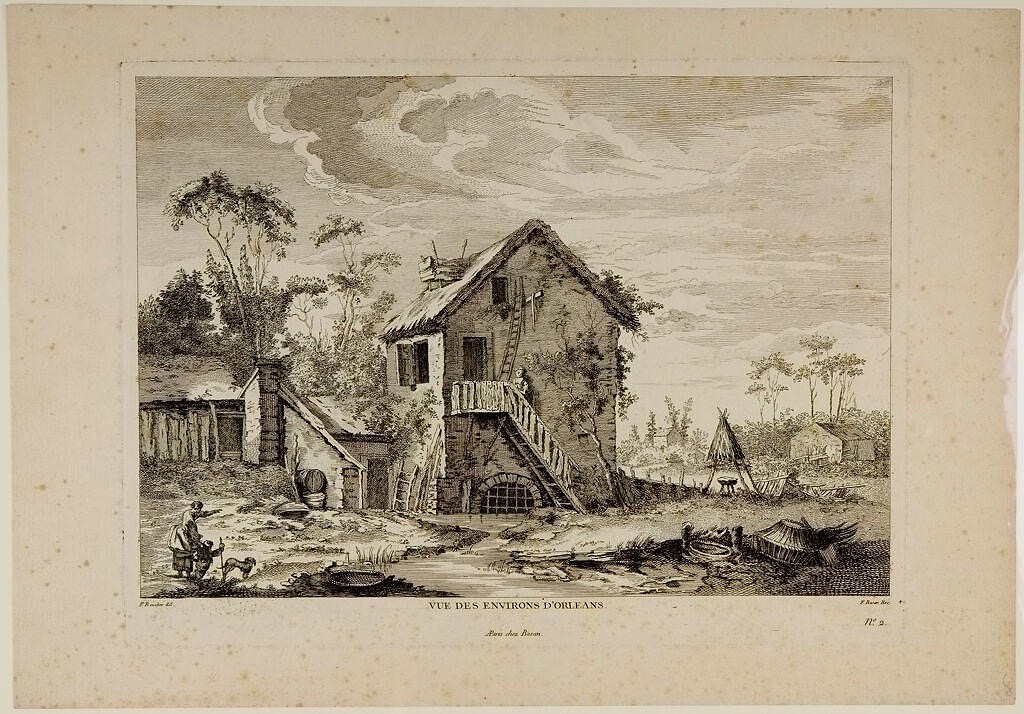
Pierre François Basan:
View in the Neighborhood of Orléans (18th century)
"When the school seems like the fanciest property in the whole precinct …"
As my old hometown transforms into a destination resort featuring innumerable wine-tasting rooms and new high-end restaurants, I spent an afternoon walking around the neighborhood where I grew up sixty and more years ago. Fortunately, I was born into a boom time, Post-War, filled with promise. Most houses were filled with families who kept them up, with few exceptions. Lawns were regularly mowed, shrubbery trimmed. I've said it before: I grew up in a Walt Disney® movie.
It's instructive to see what's become of all that promise.
Canvassing
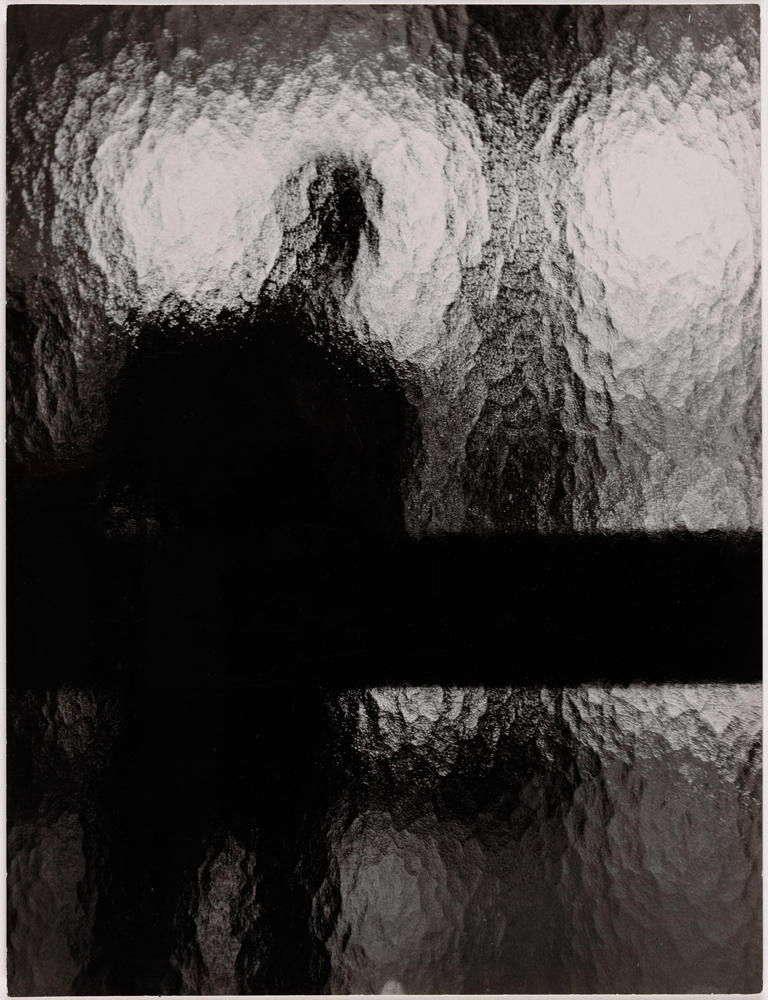
Siegfried Lauterwasser:
Outside the Door, Cologne (1950)
" … we might just be GoodNuff to accomplish that."
When The Muse was still considering whether to run for our county's Port Commission, I dreaded one aspect of campaigning. I figured that I could easily assimilate many of the duties of the role of the campaign manager she insisted I become, all but one: Canvassing. I carried a not unreasonable fear of going door-to-door to promote the candidate. This aspect dredged up images of selling vacuum cleaners and collecting for my paper route, my idea of the worst dead-end job, and my least favorite part of running my newspaper route. I was introverted enough to revel in riding my bike six and a half miles every morning, rain or shine, delivering papers. Still, I dreaded meeting the customers I served. I much preferred to be like the milkman, reliable yet unseen. I didn't want to creep around on people's porches interrupting routines. I also feared encountering one of those baby-eating MAGA morons who might try to use me for target practice.
I hesitantly agreed to try to fulfill the role of her campaign manager, a role I've recently renamed Campaign Mismanager because that title better describes the services I provide.
WritingSummary For The Week Ending 09/28/2023
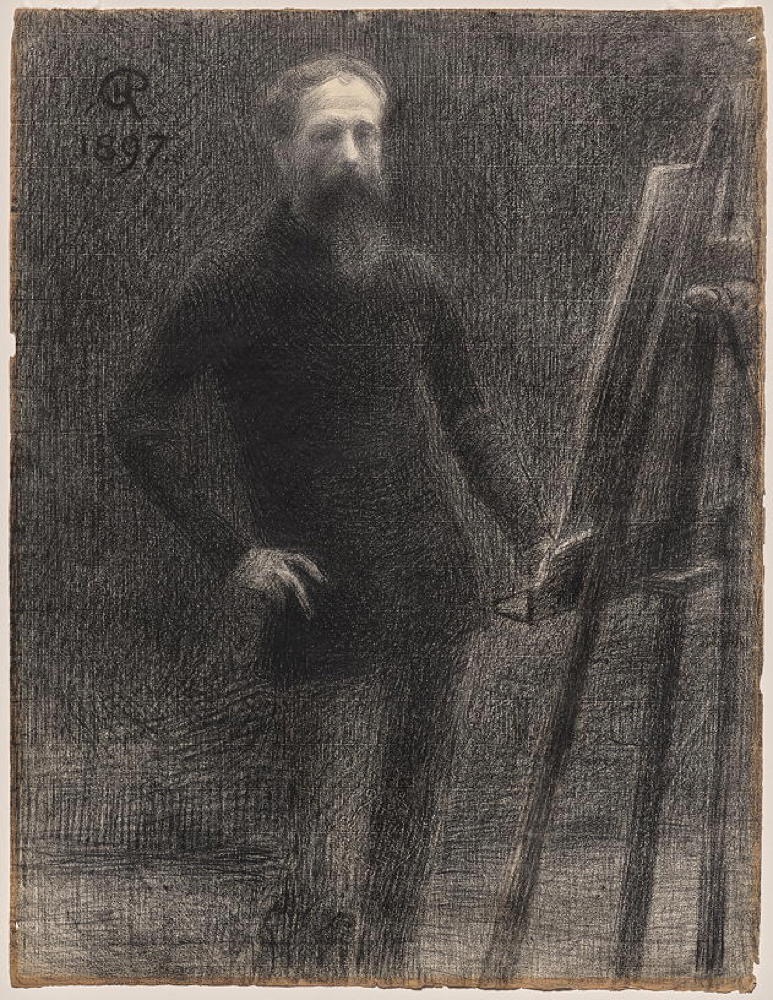
Hippolyte Petitjean: Self-Portrait at Easel (1897)
Light Seeps In Regardless
When The Muse gets The Blues, there's little I can do. Even though I am our relationship's recognized Emotional Support Animal, my powers do not stretch much further than my fingertips. When The Muse gets The Blues, there will be no laying upon of my fingertips. I cower in my corner, which, at that moment, feels more like hers, and I hope for the best. She cannot maintain her Blues for more than a few scant days, which, of course, last forever. She will have been actively working her way out of her ditch and around her wall since slightly before her fall, and she's never yet failed to find an exit. The moment she glimpsed the exit, the atmosphere brightend around here. Even the cats noticed the retreating low-pressure area. Life returned to what passes for normal again, though the receding downtime was not precisely alien. We know the whole mix that constitutes the human experience. I try to keep my head down and focus on my work when The Muse gets The Blues. I claim she was experiencing some campaign doldrums, a perfectly normal condition every campaign and campaigner has experienced before her. Light seeps in regardless, and the story continues with renewed earnestness, GoodNuff for our intents and purposes.
AlreadyKnowing
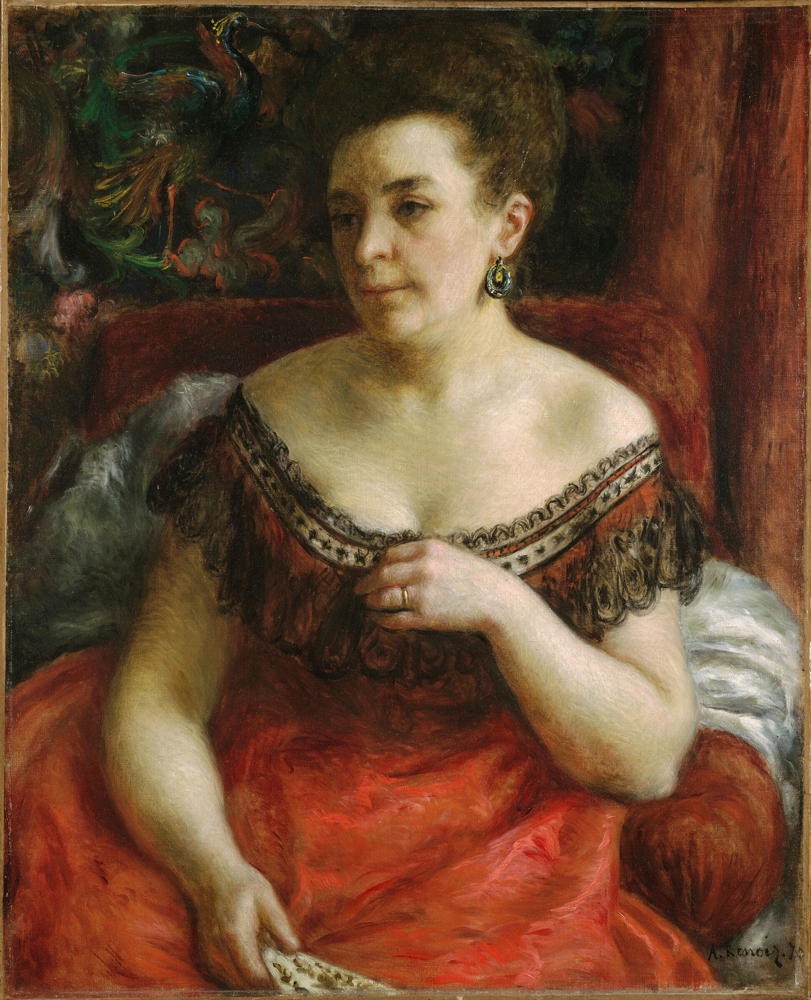
Pierre-Auguste Renoir:
Madame Pierre Henri Renoir [Blanche-Marie Blanc] (1870)
"We're both still learning, or could be."
The older I become, the more I carry a sense of AlreadyKnowing, and this sensation seems like an awful burden. I could once routinely show up knowing I didn't know, leaning into a learning, open to new experience. Now, I often arrive dreading the upcoming experience, knowing that I will undoubtedly encounter some warmed-over rendition of something we did much better back in the day. Civilization progresses curiously, if it actually advances at all, for each successive generation seems to need to reject or otherwise forget their forebears' learning and reinvent their wheels. The result often seems to be wanting to anyone present when the original was operating. So much the worse for that witness, who can no more resurrect the past than revisit it. He's sentenced to the present disappointment.
Frustration results.
TurningAround
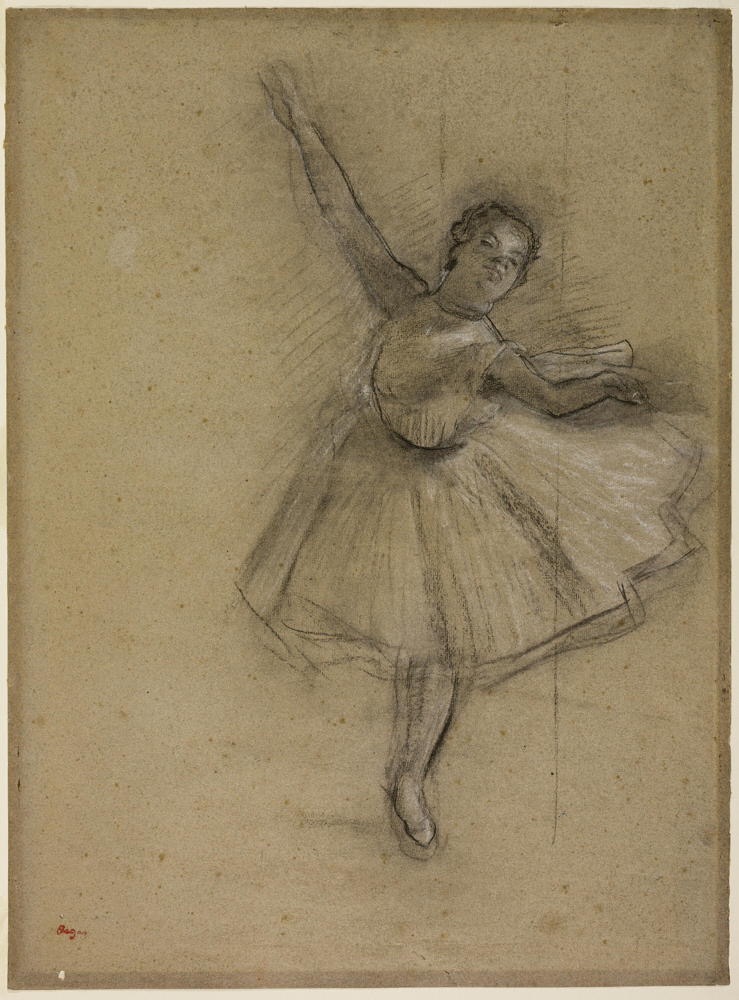
Edgar Degas: Dancer Turning (c. 1876)
"I solved nothing and resolved everything …"
Contrary to popular misconception, most difficulties do not need fixing. Yes, they certainly seem to need fixing, but this appearance often proves misleading. I spoke yesterday of TheWall, a real barrier to forward progress. I insisted that I would need to find some way over, under, around, or through that wall to unstick myself, but that insistence played into this prevalent misconception. I managed to escape that wall's influence by less radical means, by what I might call a GoodNuff technique. Please make no mistake, TheWall's still there, but it no longer holds much influence over my progress. Did I go over, under, around, or through it? No, I didn't. I evaporated its power over me instead.
Promise wields great and mysterious influence. I can, for instance, feel absolutely up against TheWall one minute and, the next minute, feel utterly liberated from that wall's influence.
TheWall

Josephus Augustus Knip: The Aurelian Wall in Rome (c. 1809-12)
" … always stumbled upon some resolution."
It's not if but when. Never whether, either, because as near as I can tell, we each encounter TheWall, usually at an inconvenient time. TheWall often amounts to more of a cognitive barrier than a physical one, but the way this universe works, sometimes a physical barrier brings the metaphor into sharper focus. Anything that seems to stand in the way of forward progress can stand in as TheWall. Discouragement has always been a popular flavor if not necessarily a crowd-pleaser. Whatever flavor your barrier comes in, it will be your challenge to find some way to overcome the blockage. It rarely matters if one manages to go over, under, around, or through. The fates usually leave that choice up to you and the conditions at hand to influence. Some cognitive walls can be imagined into falling. Most walls turn out to be cognitive ones.
There seem to be rules against publicly admitting to the presence of a personal wall.
The Wabi-Sabi Corner
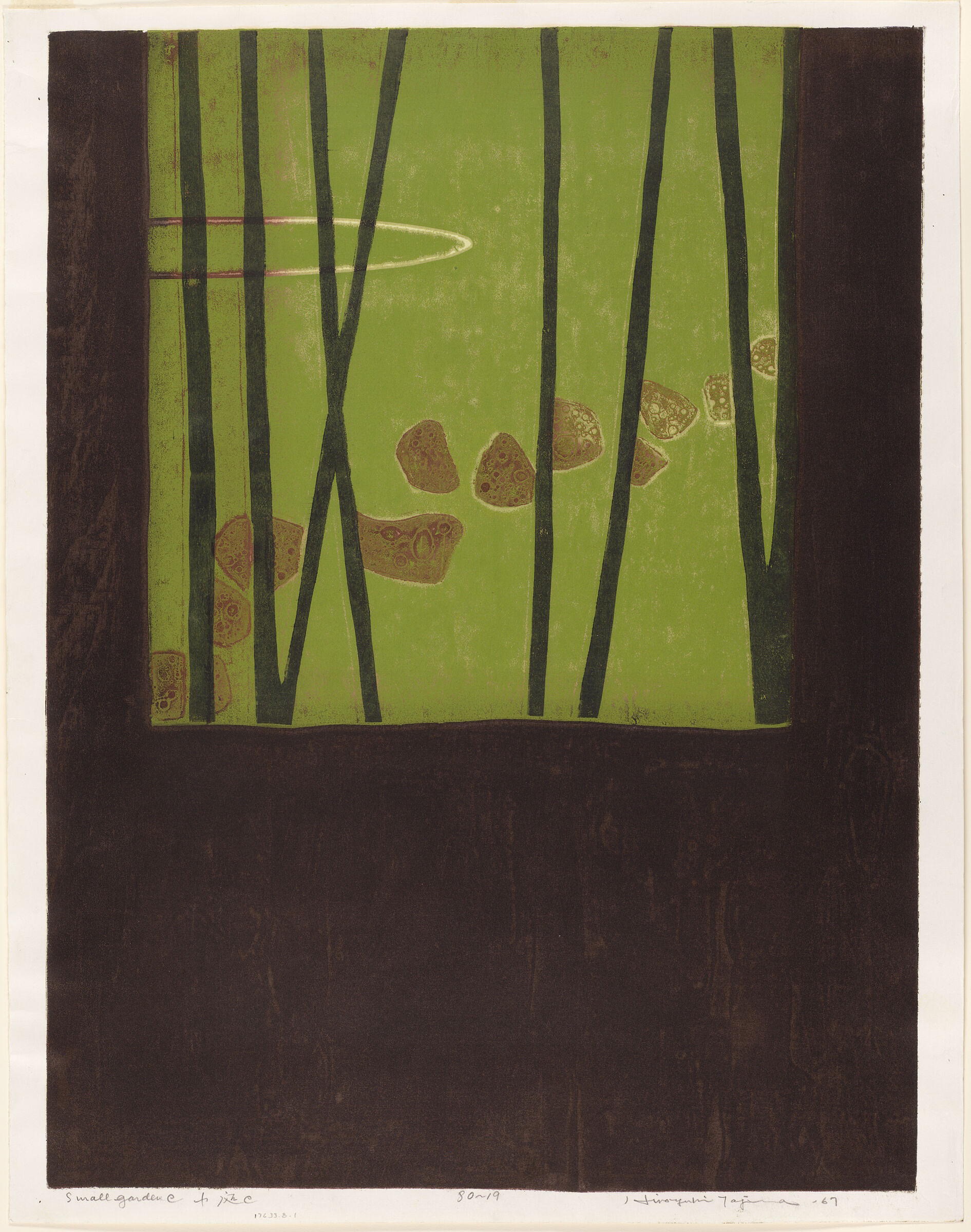
Tajima Hiroyuki: Small Garden (Shōwa period, dated 1967)
In traditional Japanese aesthetics, wabi-sabi (侘寂) is a worldview centered on the acceptance of transience and imperfection. The aesthetic is sometimes described as one of appreciating beauty that is "imperfect, impermanent, and incomplete" in nature. It is prevalent in many forms of Japanese art. -Wikipedia
" … a universal rule insisting upon less than perfection …"
Every gardener should maintain a Wabi-Sabi Corner, a corner deliberately unfinished, overgrown, and messy compared to the rest of the place. This practice helps keep the universe in balance, for this universe seems insistent upon maintaining a certain volume of unbridled messiness. Perfection might be its sworn enemy. Even the most famed gardens in the world feature one of these corners, though it might take some searching for a visitor to find them. They are never showcased, but they do exist. Even here, in The Villa Vatta Schmaltz Gardens, I scrupulously maintain an unmaintained corner of the yard. The Muse complains that this corner embarrasses her since it has traditionally been a corner everyone who passes can see. It's that edge just beyond the reach of every sprinkler, that corner not on my usual rounds. I've let the wildness take charge there, and the universe remains balanced. You're welcome!
Our neighborhood, too, has featured a Wabi-Sabi Corner property.
Incomparable
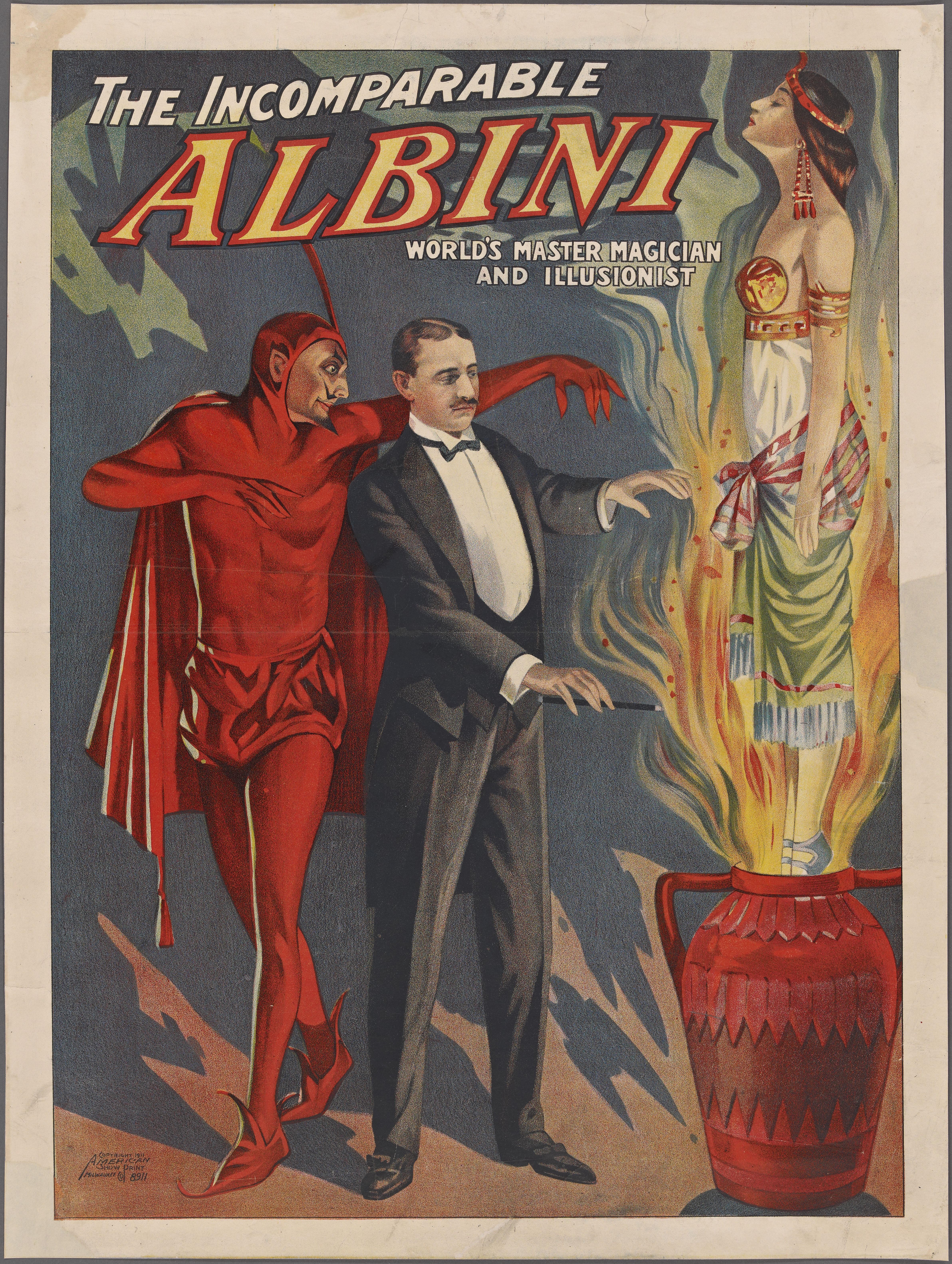
Billy Rose Theatre Division,
The New York Public Library. (1911).
The Incomparable Albini Retrieved from
https://digitalcollections.nypl.org/items/b5cfbf49-a59f-7548-e040-e00a18060aef
"What if we've already arrived …?"
One of the more innocent human tricks involves comparing ourselves with others. A practitioner might select from an infinite number of attributes to compare, most of them utterly subjective. From the wicked witch's question—Who's the fairest one of all?—to questions of relative intelligence, each might represent Fundamentally Unanswerable Questions, FUQs. They might be responded to in an equally infinite number of ways, any of which might produce reassurance or devastation, depending on the situation. One rarely slows down to consider if these questions might be worth asking. What would you have if you truly were the fairest one of all? Fairness seems a fleeting attribute and rather superficial. Such assessments, especially when self-assessments, seem questionable. Other than a temporary boost to self-esteem, the question might not be worth asking under The Don't Ask Questions You Don't Really Want The Answer To Rule.
Let's say we're all the fairest in the land. If this notion seems untenable, consider the alternatives.
AModestProposal
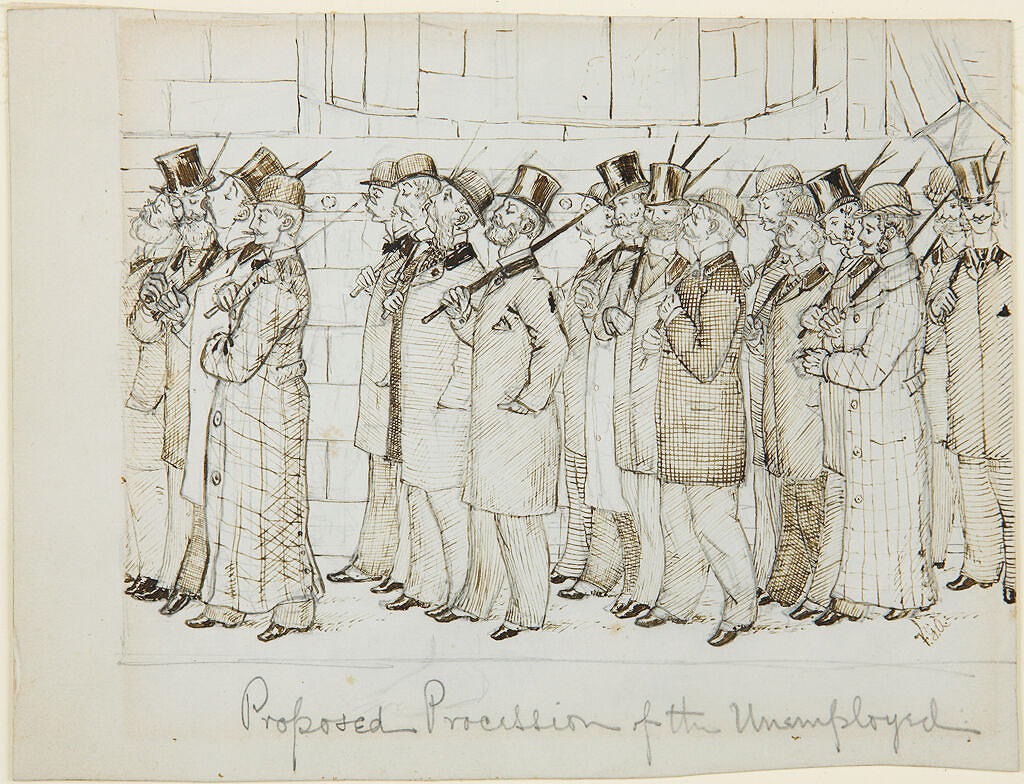
Francis Gilbert Attwood:
General Benjamin F. Butler's Nightmare:
Proposed Procession of the Unemployed
(19th century)
"What if we're already plenty …"
To this day, I am assailed by the same old come-ons promising to make me a great leader. When did this sort of promotion ever have traction? I cannot imagine Abraham Lincoln, who was undoubtedly the most outstanding leader of his time, enrolling with an equivalent teacher to learn the "secrets to success," and not just modest success, but the very best there ever was. This very attitude renders its message untenable and unbelievable, yet they persist. If they did not exist in Lincoln's time, though I feel confident they did, what is it about our time that sees such a proliferation of these? Some skills cannot be taught, for they are not acquired through coaching, counseling, or conventional teaching. Whatever that is, leadership probably stands near the top of this pile. However, above all other topics, it enjoys the most significant proliferation of teachers and preachers, promising what anyone qualified to become a great leader must undoubtedly be able to see right through. This thought leads me to suggest that only those destined to become mediocre leaders need ever apply to learn these secrets, though they'd properly be sworn to secrecy upon acceptance.
The secret about greatness might be that greatness holds few secrets.
CurtainCall

Riva Helfond, Curtain Factory (1939)
"My purpose sleeps in the basement or beneath the neighbor's bushes."
I woke in the middle of my short night to crawl under the covers. Two hours later, I was crawling out into my morning, knowing I was crawling into an ending. I swear that I dread almost everything now, especially the inevitable. My Summer slips over a horizon foreshortened by low clouds and an utterly alien rain. The painting suspended for a day; I built my first fire of the season just to see that I hadn't lost that ability through the unrelenting Summer heat. When the turn comes, it shocks even the best-prepared, most anticipatory person, even the one who'd been counting down, even the one focused upon Honing.
It must not matter what topic I choose.
WritingSummary For The Week Ending 09/21/2023

Ryūryūkyo Shinsai:
Boy Writing (Edo period, 1615-1868)
Stumble Into An Ownership
Experience doesn't very deeply influence some things. This week, I almost finished my twenty-fifth series, Honing, but nothing I'd ever experienced before properly prepared me for this almost event. I should have become accustomed to nearly finishing by now, but it remains a shocking and unsettling experience, not even the same way once. I started this series thirteen weeks ago and struggled, as I always do, to feel as though it belonged to me. I created the first stories as an imposter, holding my breath while hoping not to be discovered. I grew into their author, only recently feeling as though they might somehow come from and belong to me. It was never different. I crawl before walking and walk before I fly. I finally fly only to discover that I've run out of sky. The allotted time for this series is over, and I dare not linger over the carcass. This is how this writer experiences accomplishment. I finally stumble into an ownership, only to forfeit it to start my mystery anew.
ExitStageLeft
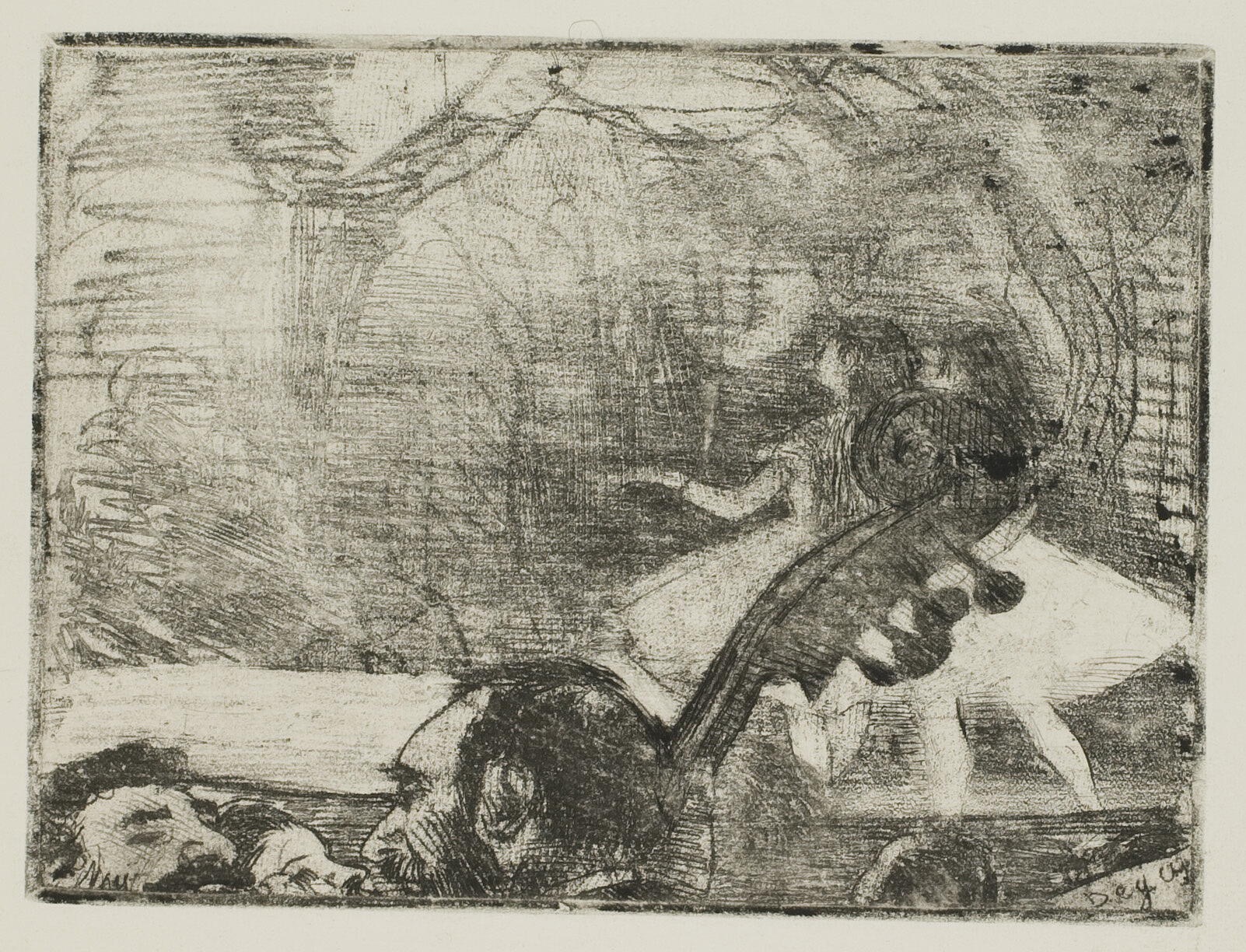
Edgar Degas: On Stage I (1876)
"All the world’s a stage,
And all the men and women merely players;
They have their exits and their entrances;
And one man in his time plays many parts,
His acts being seven ages."
—William Shakespeare
(from As You Like It, spoken by Jaques)
" … one final curtain call for this production that never actually was."
Contrary to popular misconception, all the world never was a stage, and all the men and women were always much more than "merely players." Yes, they might have their exits and entrances, but they do much more than just play parts in several acts. That's all analogies, and the one thing one must understand about analogies should always be that they do not describe actual anything. The fact that Shakespeare employed this analogy means precisely that all the world is not now, nor was it ever a stage. To think otherwise violates the first rule of analogy, which insists that they never be taken literally. We see the terrible result of mistaking analogy for description played out in the world's great religions, each of which seems to possess a widely misinterpreted guidebook. While it's undoubtedly true that misinterpreting makes miracles much easier to manifest, they also materially mislead. Misinterpreting brings glorious suggestions into the realm of misleading definitions where an analogous savior somehow manages to feed a multitude with a single small can of tuna.
How much richer our lives might become if we could steadfastly refuse to take anything literally, anything at its unavoidably misleading face value.
UsedTos

Rembrandt van Rijn:
The Sampling Officials of the Amsterdam Drapers’ Guild,
Known as ‘The Syndics’ (1662)
"I UsedTo be an innocent, but now I'm more experienced."
I possess a long and ever-growing list of UsedTos: things I used to do, beliefs I once held but outgrew, foods I once treasured but now consider illegal, and assorted discarded habits, vices, attractions, loves, and hates. I like to think that my tastes have moderated over time, that my sophistication has been steadily climbing some evolutionary ladder, but that's probably idle chatter, my monkey mind keeping me distracted and entertained. I still declare several of my UsedTos as remaining on my list of current skills, though I'm surely out of practice on many. I was once successful, for instance, but it's been ages since my successes or failures have influenced my choices. I no longer strive after achievement. I put down my head and continue onward instead.
The purposeful life isn't all it was once cracked up to be.
Estrangement
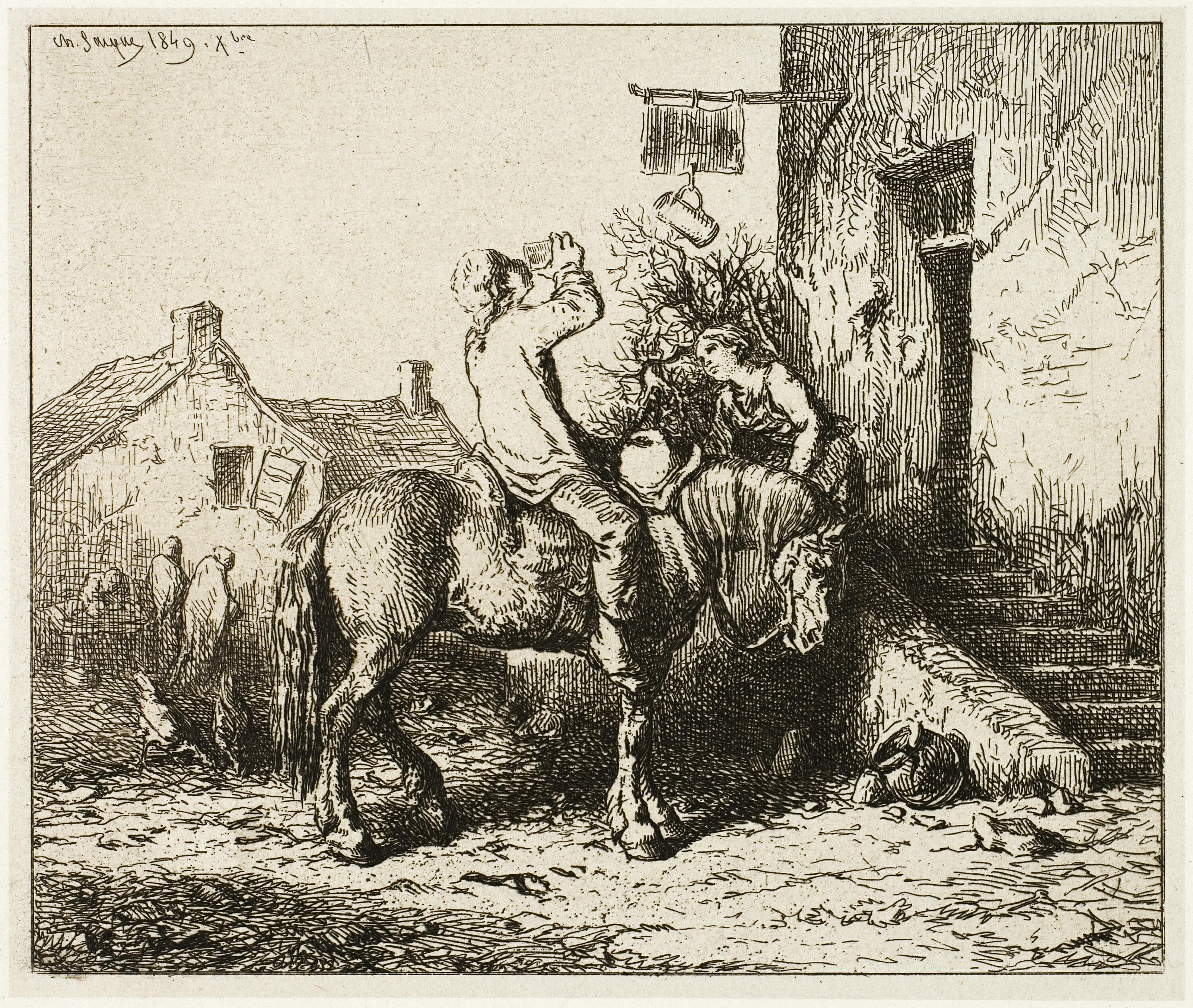
Charles Émile Jacque:
Entrance to an Inn, with Peasant Drinking (1849)
"We remain related regardless …"
What can I say about Estrangement? It seems the strangest form of human engagement, for it can only exist between people who were once rather tightly connected. Strangers can never become estranged; only friends and family can. Usually, something happens or was said to occur before becoming a legend, a defining event, or a Rubicon crossed. The memory might have never captured the offense, but it will never forget the occurrence. Over time, the relationship will seem irreparable, and the principles involved accept this and move on. "On to where?" might be the operant question. It might have seemed slight to one of the parties, but the effect will become tectonic for both. An absence appears by mutual consent, and people move on with their lives, disappointed with how that one point turned out, yet powerless to make it different. The experience gets filed under Regrets but will never be understood in the same way or entirely forgotten by either party.
We read of Prodigal Sons and more distant relatives reconnecting after lengthy separations.
Reading

Édouard Manet: Woman Reading (1880/81)
" … successful distraction might disrupt anything, even distraction itself."
I am a cog in an enormous machine every bit as threatening as the much-feared Military-Industrial Complex. I might label mine The Non-Military Conscientious-Objector Complex because of my background with the military draft, though my complex has little to do with military matters. Mine's all about conscience, conscientiousness, and consciousness, three similar words with enormously different meanings. These three terms share at least one thing in common, which might be, without stretching their native definitions or attempting to create controversy or conspiracy, Reading. I read because it's always the right thing to do. I can never go astray if I'm reading. I also read so that I might live well. I believe it's impossible to live well unless surrounded by books. I also read to achieve the awareness required to comprehend this life. I consider it my moral and civil duty to at least try to remain literarily current.
My occupation feeds this machine.
Betterment
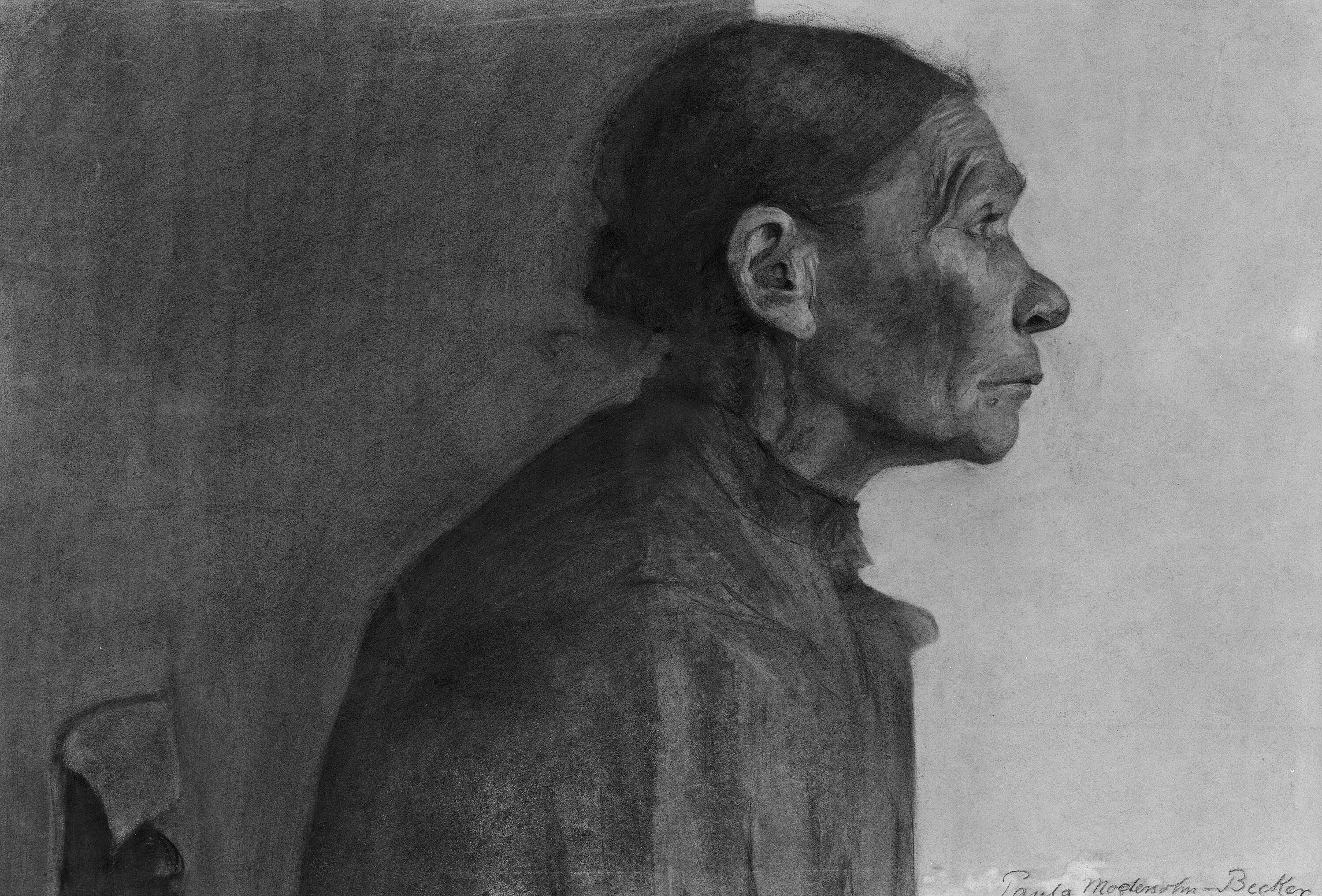
Paula Modersohn-Becker:
Portrait of a Peasant Woman (1898/99)
"I've written plenty, but that only matters if I'm still writing."
I began writing these stories to prove something to myself. I intended them to serve as a dedication test, proof that I was, as I believed myself to be, a writer because writers don't just declare their profession; they write. If they pursue commercial success, writers must also publish; indeed, those might well budget more time for promotion than production. Most writers were never published, for they created for purposes other than publication. We believe that the system set up to identify and distribute the best writing succeeds in achieving that end. Still, we have no way to verify that this is or ever was the case, for the stuff the system failed to identify was never included in the assessment and couldn't have been. In Dicken's time, for instance, it seems entirely possible that a few dozen scribblers produced novels immeasurably better than anything he ever imagined. However, for one reason or another, they never found a publisher or any means of distribution. Their neighbors might have seen those authors as eccentrics, perhaps even hermits; they maybe even became the butt of ungenerous stories about how they only thought of themselves as writers. Only the writers themselves ever knew the truth. If they wrote, they were writers.
I long ago proved the point of my experiment.
ReConsidering Reconsidering Again

studio of Rembrandt van Rijn:
A Bearded Man Wearing a Hat (c. 1655–1660)
" … without any meaningful answer."
Each quarter, at more or less precisely this time, as the final writing week of a series begins, I face a reconsidering again. After twenty-six repetitions, the reconsidering must have at least become a tradition. It seems necessary, though, to slow down in the face of completing to solemnly consider whether this pattern continues to be worth continuing. The question seems more significant than any answer it might inspire, for by now, I might just as well presume I know the answer heading into the pattern. I do not ask my question to produce a novel response, but to attain reassurance that my answer still holds relevance, that it remains capable of motivating, of promising to satisfy if not every day prove satisfying. I play a longer game than I can ever sense, so I must engage with belief each morning that the long run will still take care of itself.
I am ending my twenty-sixth series since I started producing daily stories.
BetterStory
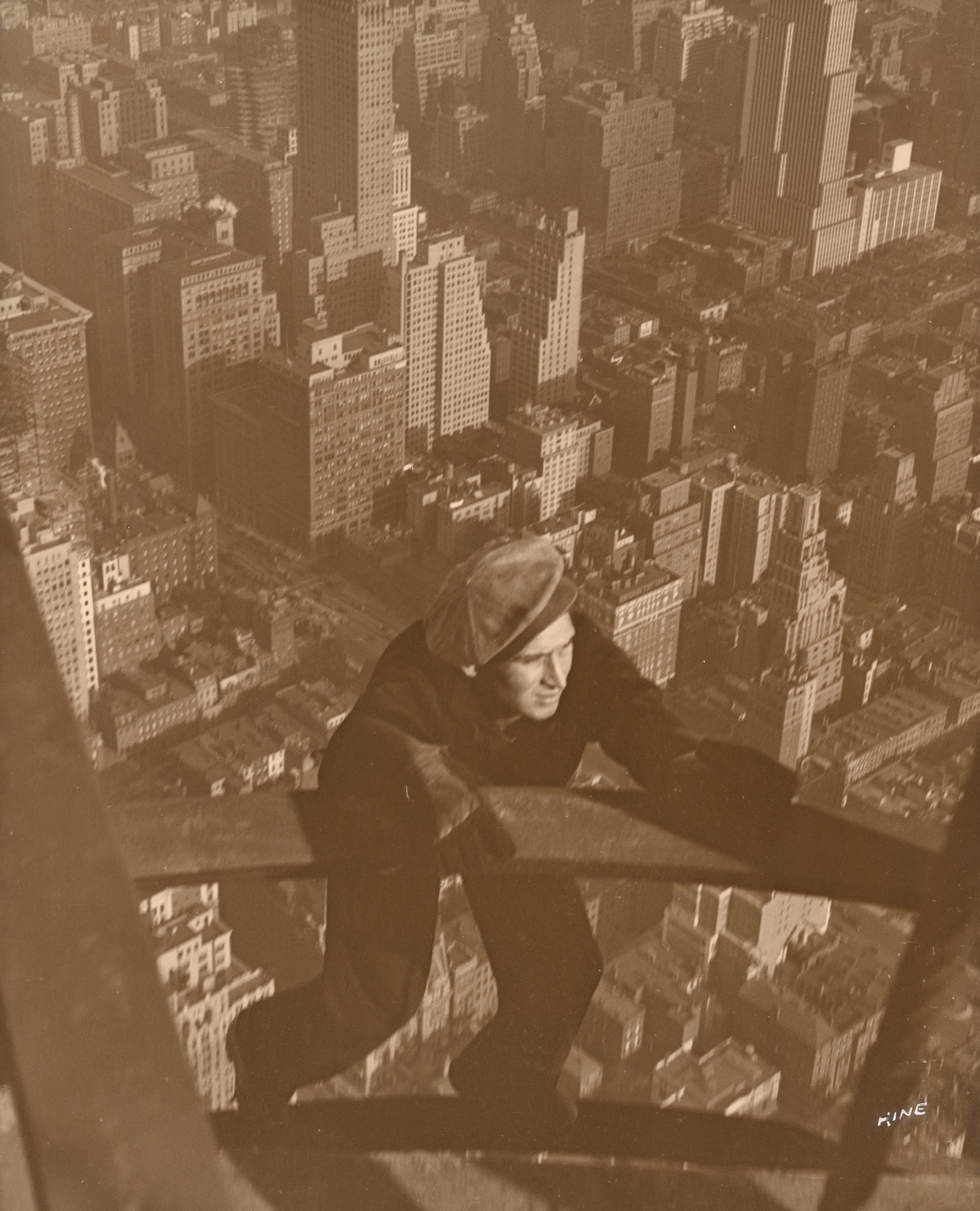
Lewis Wickes Hine: Climbing up the Beams on the Empire State-100 Stories Up (1931)
" … it will only be my legacy."
I have lately encountered several people who seem to be living disappointing stories. They serve as complainants in their own lives, disgruntled by their plotlines. I wonder why they chose to feature those stories, ones which seemed especially designed to disappoint them when they might have chosen any of a nearly infinite array of more satisfying ones. I didn't ask any of them that question, and I suspect, without testing my suspicion, that few of them would offer an easy or appreciative response.
What about reality?
WritingSummary For The Week Ending 09/14/2023
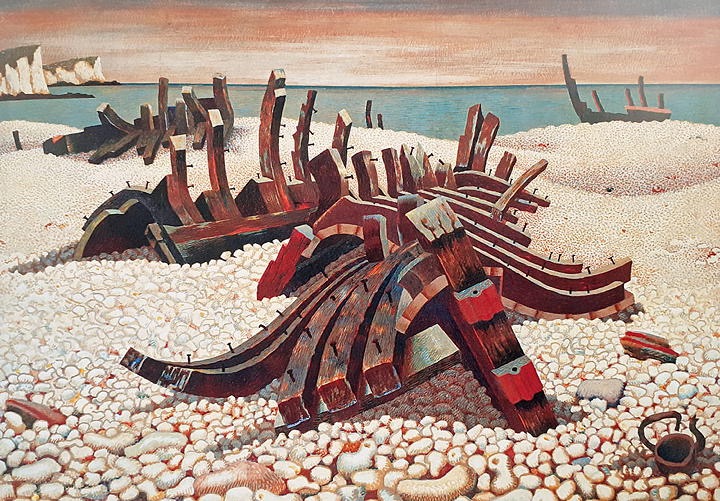
Edward Wadsworth: Requiescat (1940)
After The Physical Experience Ends
My weekly writing summaries serve as both reminiscence and discovery. I inevitably discover insights that hadn't connected through the week before I paused to reflect. This might be the highest best purpose of reflection, that it sometimes elevates experience into insight. We move through our lives as innocents—ignorants—only understanding later, often after it's too late to make any difference. We sit, then, wondering how our experience might have felt different had we understood before we stumbled into the associated insight. Experience never ends at the apparent end of the experience. The ending lags at least a few beats beyond where the incoming ceases. Without reflection, the sensory experiences, even the lived experiences, make little sense. The meaning emerges shortly (or longly) after the physical experience ends. Better, probably, when we can acknowledge this difference.
Weekly Writing Summary
I began my writing week by reprising a posting from July, 2022 about Sleep "I realize I'm a lousy sleeper. I never aspired to become any better at it than I've become. Indeed, my current lack of skill represents a lifetime of focused practice, the payoff, not an absence."
—
I admitted to an introvertion preference and described the effect of too much extroversion as ExtroversionPoisoning. This story proved the most popular this period. "I sometimes feel after over-extended exposure that I'm suffocating and can hardly continue breathing. These times alarm me most, for the weight of the world presses down upon my chest, and I simply must find respite. I will decline your invitations then and avoid promising to attend. I will not attempt to be anybody's friend, for I must befriend myself again before I can be anybody else's credible companion."
—
I wondered if I overthink as much as I think I overthink in OverThinking. "It seems a genuine wonder to me when I successfully complete anything. After working my way through a hazy half-dozen scenarios, each demonstrating how I could not possibly succeed, the most unlikely result always, always, always shocks and surprises me. I wonder then if I really do overthink as much as I think I do or if the accompanying rigamarole might just be necessary for me to get begun and then get through anything to done."
—
I experienced a familiar scenario this week so I wrote a story about its substance, Idiot-Making. "We seem to be, as a species, very skilled at Idiot-Making. We can transform virtually anyone into an idiot by merely less than generously interpreting their performance."
—
I posted a curious story about the DangerousPlaces I inhabit. "Cynicism happens when life wounds an optimist, innocence disappoints, and a certain kind of ignorance takes preference. Cynicism produces self-inflicted first-degree knife wounds that seem to be the devil's own work to heal."
—
I reported on a delightful rediscovery, that my life's work apparently resides in weeding and manuscriopt-making in SafeHavens. "I felt surrounded by so much familiar that I lost that sense of alienation my wildly fecund prior month had induced. I felt fully re-immersed in my most treasured SafeHavens, writing and weeding. The world could go to Hell, though I'd miss it terribly. I was temporarily suspended in the space intended for me, manuscript-making and weeding, two seasonal rewards there for the taking."
—
I ended my writing week trying to describe an alien form of organization and operation, one I quietly envied when I encounter it in IndustrialCivility. "They do not possess a prestigious address, nor do they ever care to. They know what they do, and they do that well. There's no identity crisis or search for deeper meaning. The operation is just what it seems to be, no questions asked. "
—
This writing week felt like a roller-coaster ride. I began by reprising something I'd written fourteen months before. This felt like both an abrogation—what? Nothing original this morning?—and an acknowledgment and recognition that I needn't necessarily reinvent what I've already adequately considered. I honored my past by making it present again. I acknowledged the cost of fulfilling obligations and over-extending myself with ExtroversionPoisoning. I wondered if I really was that guilty of OverThinking. This question, of course, needed no answering. I encountered some vehement Idiot-Making where I was the idiot again. I admitted to living in proximity to DangerousPlaces, which doesn't make me even a little bit different or unique. I then described my protective SafeHavens. I ended this writing week admitting a tinge of jealousy for a subculture I've never personally experienced, but to which I still feel an attraction. Thank you for following along. It looks like we're finally entering the final week of Honing Stories.
©2023 by David A. Schmaltz - all rights reserved
IndustrialCivility
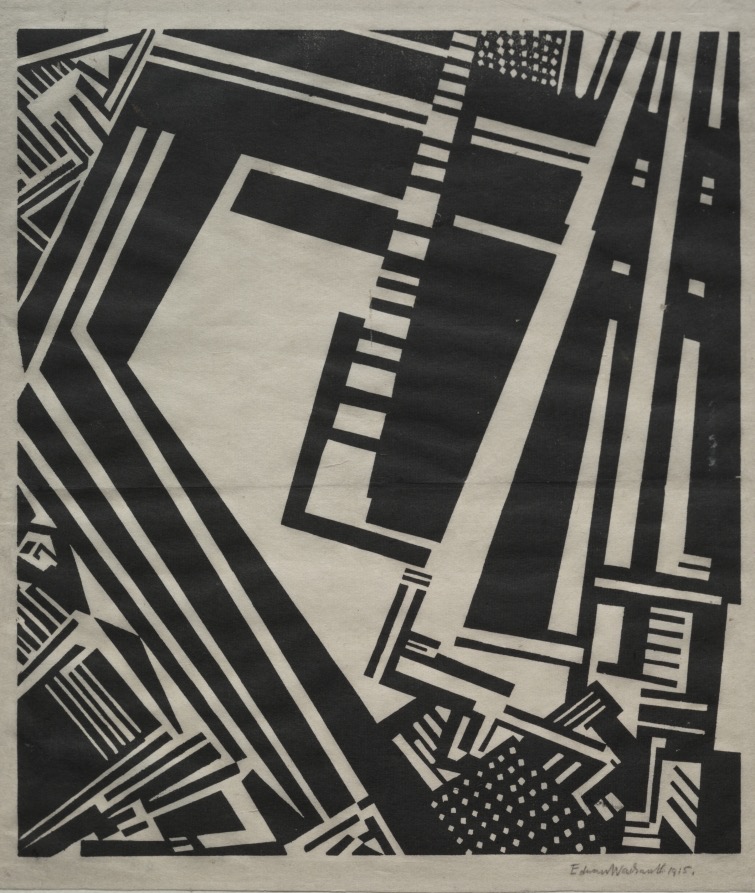
Edward Alexander Wadsworth: Illustration (Typhoon) (1914–1915)
" … people like me can only ever be a visitor. "
We inhabit a culture comprised of innumerable subcultures, each with unique rules and protocols. These subcultures might be the many we claim to come out of, E Pluribus Unum. Encountering any subculture can make anyone more aware of their own, which ordinarily exists like a fish's water, present but not accounted for. We receive little more than glimpses of other's subcultures, often through cues that seem somehow alien, different. I recently encountered one that I found enduring, heartwarming. I labeled it IndustrialCivility because it appeared to me, in my experience, most prevalent in industrial settings, a standard set of protocols common to those enterprises. These seem starkly different than the practices I've experienced in offices, for instance, or in clinics.
IndustrialCivility first appears orderly with almost a military discipline.
SafeHavens
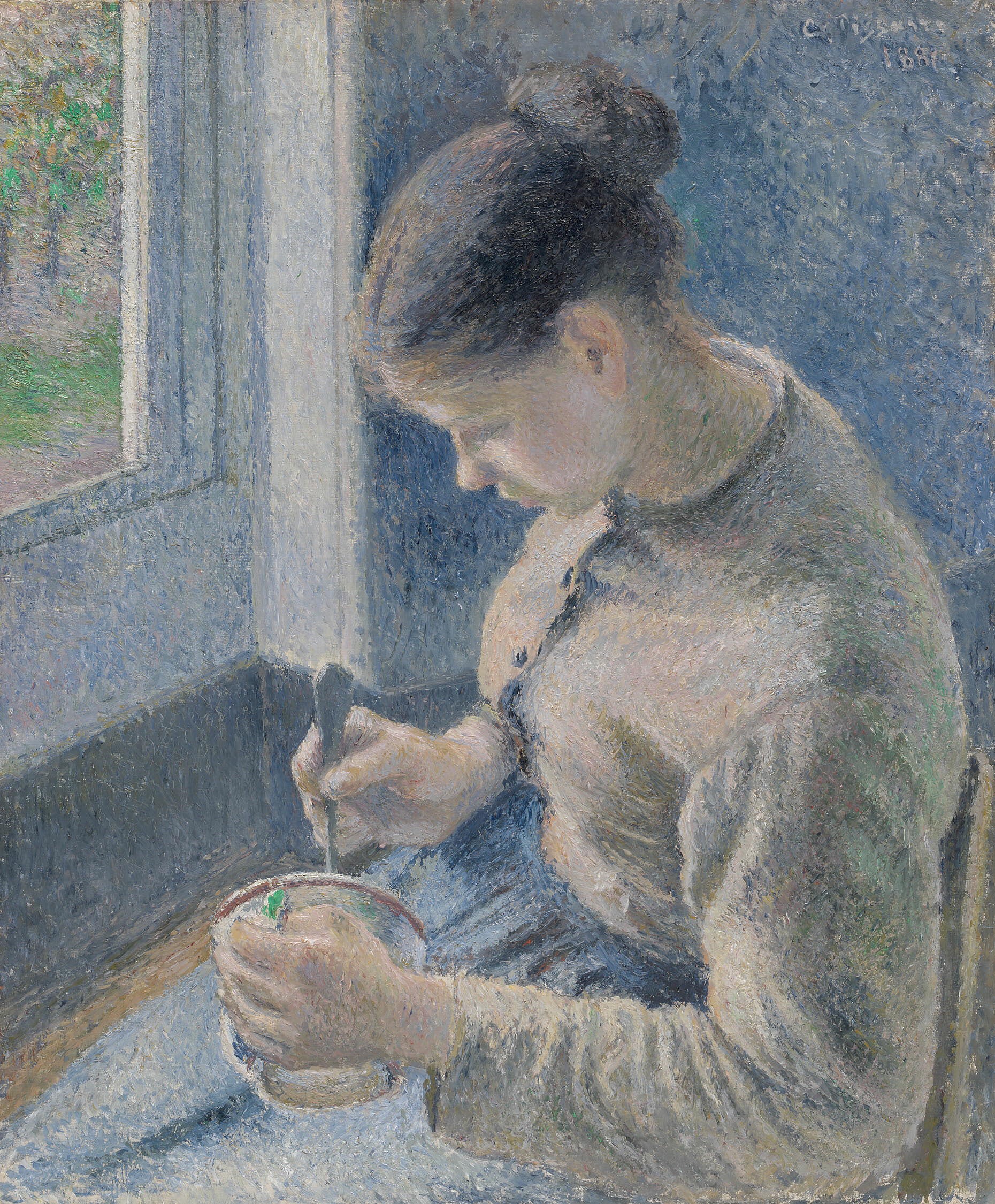
Camille Pissarro: Young Peasant Having Her Coffee (1881)
"… rewards there for the taking."
The hapless homeowner faces a fecund entropy through the month following mid-August. The garden's finally producing and achieving exponential returns. The Eurasian Stinkbugs find their prey, too, and threaten to spoil The Muse's long-awaited tomato party as well as the rhubarb. Weeds take full advantage of the often frantic watering as humidity levels plummet to the lowest of the year while solar radiation threatens to burn everything in place. It's usually a frenetic pace, a plate-juggling class of fruitless efforts. Self-esteem plummets in the face of overwhelming opposition to the regular rules of order. Fertility leads to pregnancy and pregnancy to a disruptive addition to the family. I struggle to fulfill my resulting unintended obligations.
I think of our Villa Vatta Schmaltz as one of our SafeHavens, a secure spot within the chaos.
DangerousPlaces
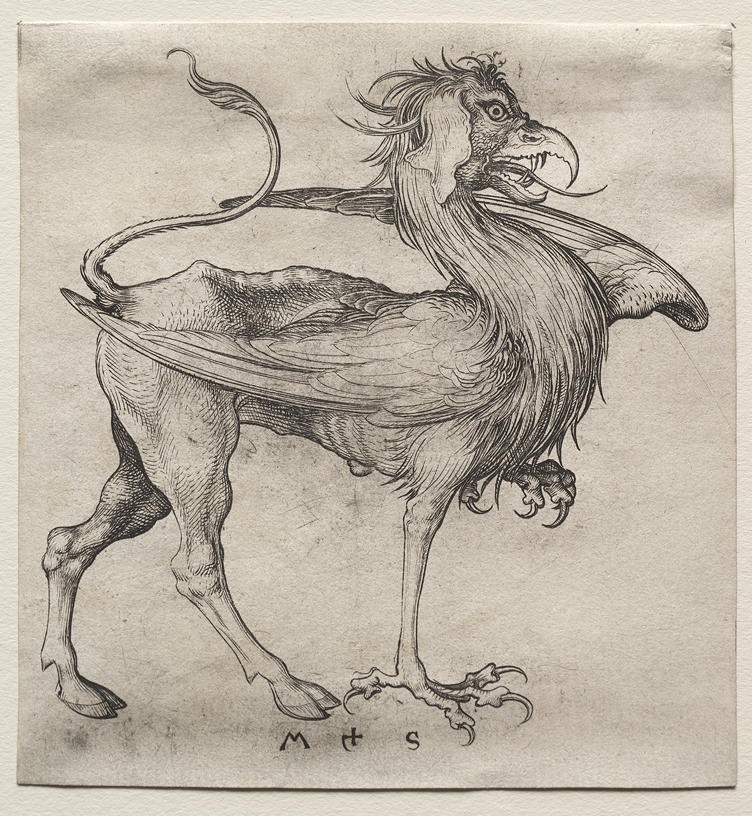
Martin Schongauer: The Griffin (c. 1480–90)
" … some days seem to need almost the whole day to recover …"
I often forget about the DangerousPlaces my work compels me into. I engage almost blithely, innocently exploring when I might more thoughtfully engage. I consider my manner of engaging anything but calloused, for I firmly believe that one must never become cynical. I hold myself to knowing enough to justify cynicism but choosing not to become cynical as my way to get even or stay balanced. This sometimes works. Cynicism happens when life wounds an optimist, innocence disappoints, and a certain kind of ignorance takes preference. Cynicism produces self-inflicted first-degree knife wounds that seem to be the devil's own work to heal. Better to become a Griffin's dinner than to live a cynical existence.
These DangerousPlaces sometimes deeply wound me.
Idiot-Making
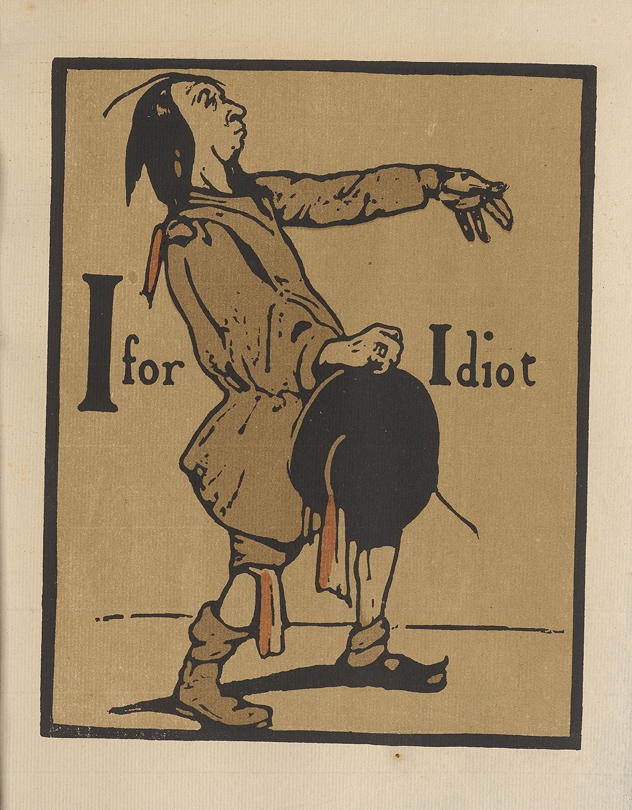
William Nicholson: I for Idiot (1898)
"What I choose to do in that moment always defines the outcome of my effort."
When contracting for consulting work, I'd usually confide to my prospective client that if we agreed to terms, at some point during the following engagement, he would find himself convinced that he had hired a complete idiot as a consultant. I suggested that what we chose to do then would define the effort's success. This prediction usually came true, not because I possess any particular foresight but because it was in the nature of the sort of work I contracted to perform that I would usually appear to be an idiot if I performed well. I would not always seem capable of foreseeing because what I would be doing could not be foreseen but always needed to be prized out, discovered in stream, and not usually beforehand. It was more hunt-and-peck work that the less experienced invariably attempted to manage utilizing prior specification, a sure and certain recipe for the appearance of idiocy at some time during the proceedings.
We seem to be, as a species, very skilled at Idiot-Making.
OverThinking

Edvard Munch: Attraction I (1896)
" … necessary for me to get begun and then get through anything to done."
I wonder if I OverThink as much as I think I do. It's true, I do often think my way through an anticipated action two, three, four, and often even many more times before I take action, and even then, I might opt to take no action at all (yet). I consider my scrutiny prudent, though not everyone would agree. How many thought experiments must a standard ketchup bottle survive before it's set aside as too complicated to open yet?
I seem to have been born to run on intuition, yet I blunt my native sort of 20/20 vision with dump truckloads of conflating cognition.
ExtroversionPoisoning
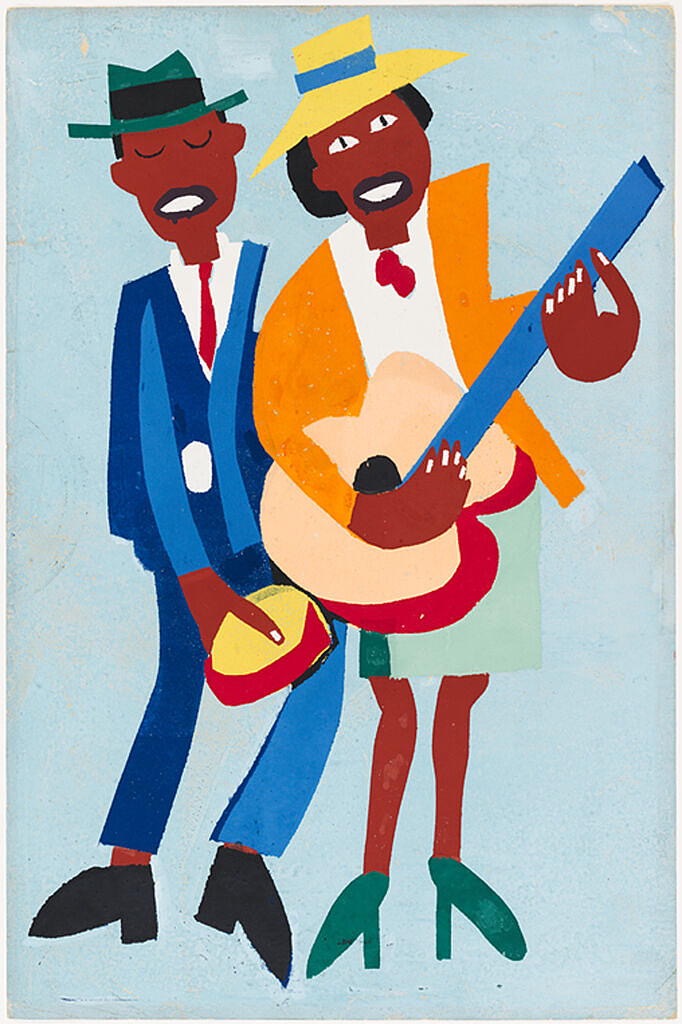
William Henry Johnson: The Blind Singer (c 1945)
" … I must befriend myself again …"
I "am" an introvert. This improper way to describe my preference ignores the fact the introversion/extroversion dichotomy does not express identity but preference. I remain capable of both extroverted activities as well as my more native introverted ones. The extroverted efforts seem to take more significant tolls, though. I can always engage as an introvert for extended periods without requiring any mental health break from the activity. I do not remember ever even once needing an extroversion break, where I felt compelled to find someone to spill my guts to so that I could maintain some internal balance. I often, though, flee into any handy old cave to recover from too much interaction, a condition I refer to as ExtroversionPoisoning.
Sometimes, I seem to become altogether too much of this world.
Sleep

Charles Bird King: The Vanity of the Artist's Dream
Former Title: The Anatomy of Art Appreciation
Former Title: Poor Artist's Study
Former Title: Still Life, The Vanity of An Artist's Dream
(1830)
" … only then could the aspiring artist ever come out to play."
Sleep certainly heads the list of all the skills that have eluded me in this life, though I should have had adequate practice with it by now. I early on identified Sleep as an enemy—an alien state—and set about trying to eliminate it from my routine as much as possible. It seemed such a sorry waste of time, time I might spend doing whatever else I might please. The wee hours, downplayed by those who've perhaps never intimately engaged with them, seemed the perfect medium for me to practice as an artist, for a budding artist needs plenty of cave time. My earliest performances were barely fit for my own experience, practice far preceding whatever perfection might later emerge. My writing, too, demanded bounded solitude and could not be produced with any audience hovering nearby and certainly not with anyone even distantly inquisitive about how it was going at any time.
So I routinely stayed up way past my designated bedtime, reading with a flashlight beneath covers, hugging my warm bread loaf-sized radio to my chest, master of my wee hours.
WritingSummary For The Week Ending 09/07/2023
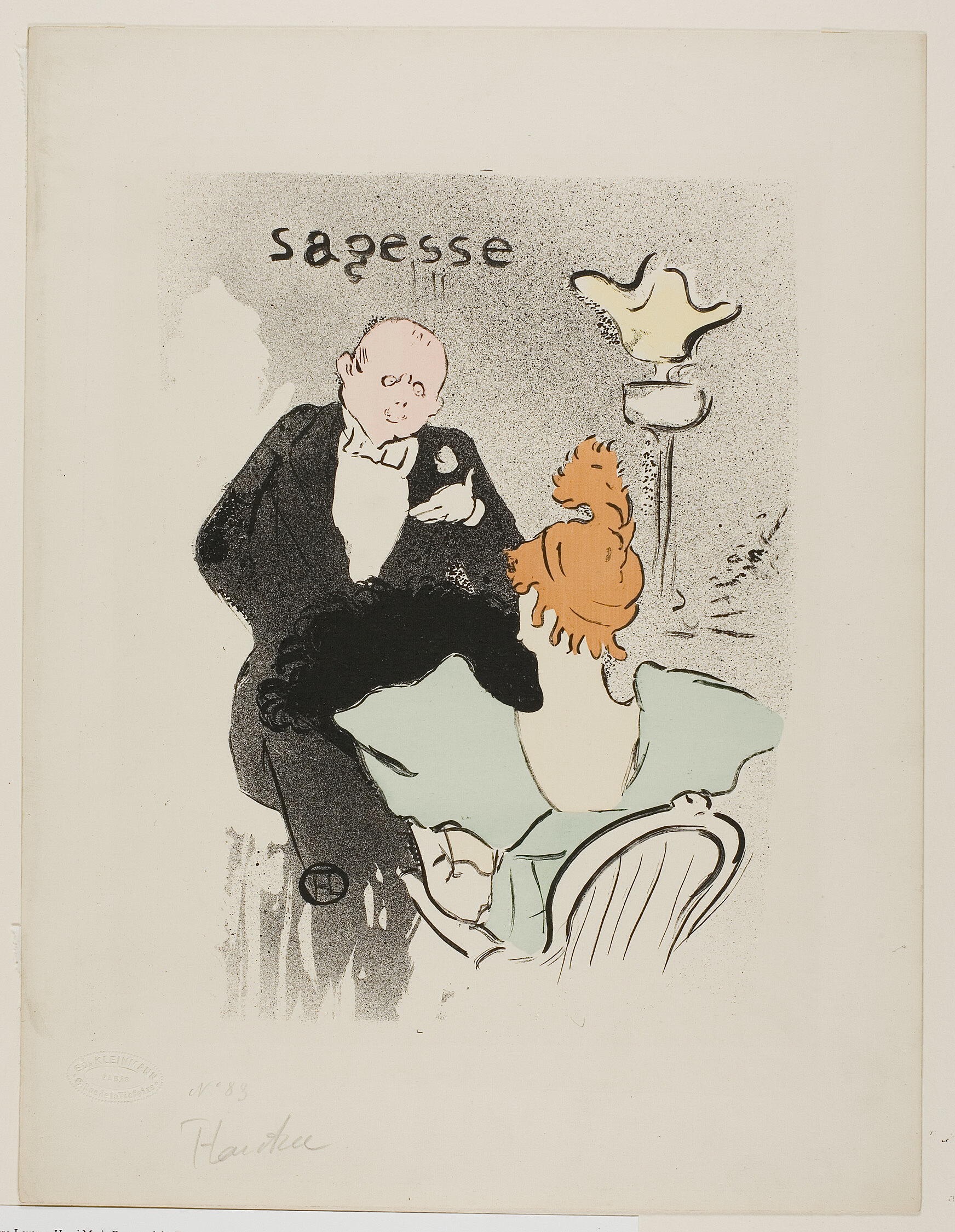
Henri de Toulouse-Lautrec: Wisdom (1893)
Not Letting My Reticence Chase You Off
The Muse insists that I and the world are inevitably better off when I get out and mingle in the world. I tend to disagree on principles. As an introvert, my world revolves around something other than public spectacle, but I cannot successfully disagree that more variety appears when I get off my duff and mingle. Her candidate booth at the local fair, as well as her entry into the accompanying parade, had me living well outside my usual comfort zone through almost this entire writing week. I didn't die. I might have even thrived. I might admit under mild duress that I, at times, even almost enjoyed the engagements, but mum's the word on that account. I remain a writer, your writer, and not some itinerant schmoozer. I'm the guy who appreciates those with social skills, who gratefully cedes center stage to those who seem to gain satisfaction from standing there. I'm atmosphere people, more than satisfied to chronicle my emotional experiences via the PureSchmaltz. Thank you so very much for following along and not letting my reticence chase you off.
Weekly Writing Summary
I began this writing week with an encounter with bureaucracy that left me feeling absolutely Gutted.
Disconceptions
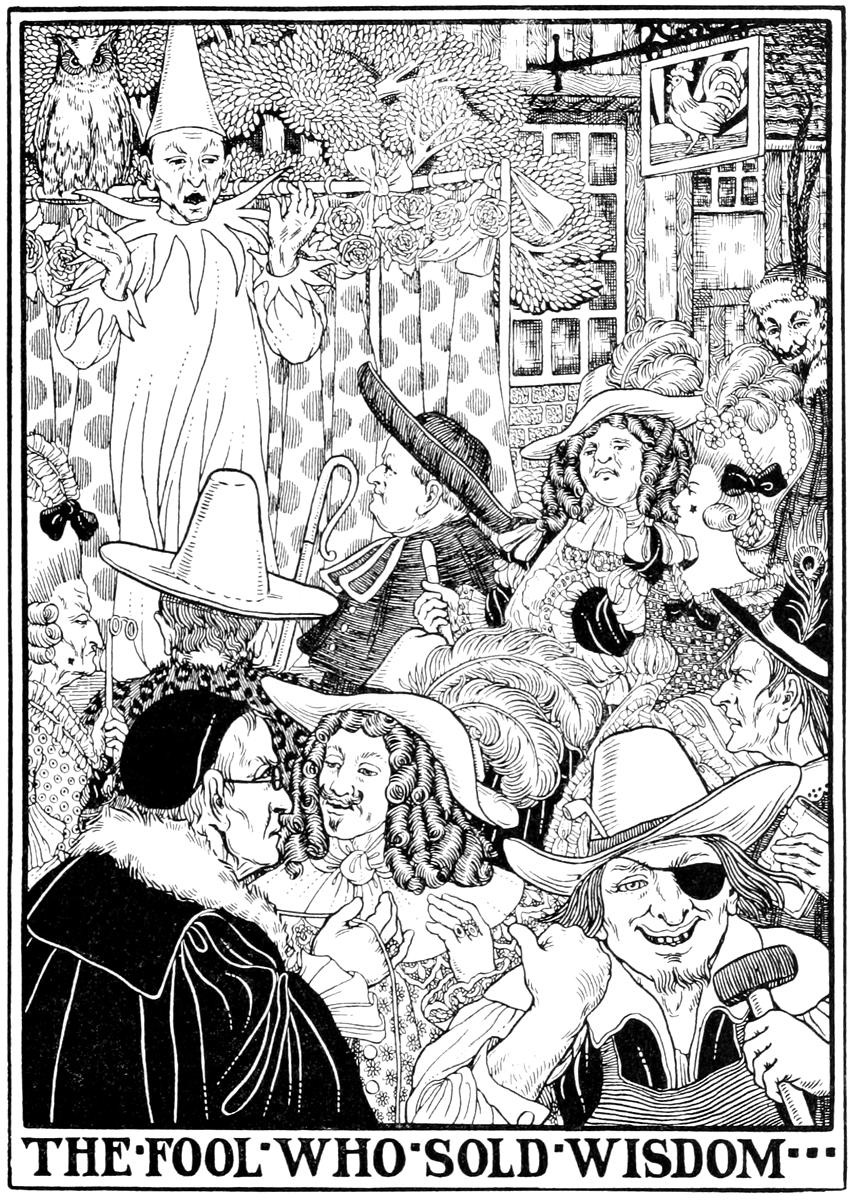
Percy Billinghurst:
The Fool Who Sold Wisdom (1900)
“ … a particular sort of Hell.”
My time in The Muse's Fair booth unsettled me. I saw an alarming erosion of conception before me as I spoke with some people. They possessed what they might accept as received wisdom, which seemed more like bullshit. I wondered how these people could each spout the same nonsense. I wondered about the source of their understanding, for it appeared unusually unshakeable. It reflected an apparently preconscious conviction that they possessed a wisdom denied their lesser brethren. I felt them suspiciously classifying me, passing me a sort of test to determine if I was one of them or one of those. I never once aspired for them to classify me as one of them in any of these conversations, but then I was also dancing along an edge because I didn't want to chase off any potential voters for The Muse.
Friends told me that these folks were victims of Fox News, an outlet I cannot get since The Muse disabled the remote control to ignore those channels.
Last_Night
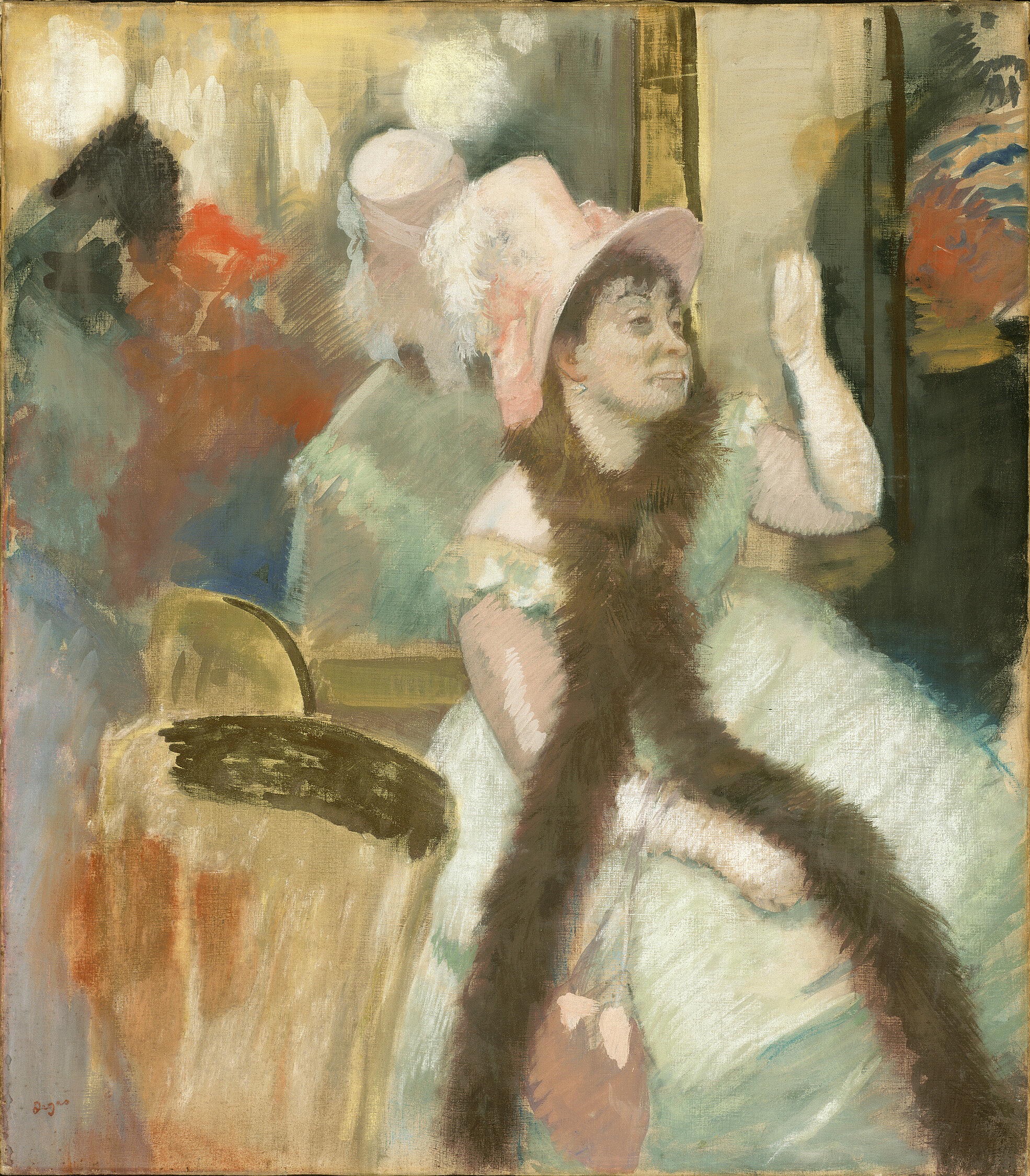
Edgar Degas: Portrait after a Costume Ball
(Portrait of Madame Dietz-Monnin) (1879)
"May we always remember."
Every exhibitor finally figures out their trade on the last night of the Fair. The five long days before were merely practice for this grand finale performance. By five pm, everyone's walking around like zombies, the unavoidable effect of back-to-back-to-back-to-back twelve-hour days standing on unforgiving concrete or sitting in equally torturous folding chairs. Each became a master of their wares by repetition. The come-on tried a dozen ways before finally settling on one that reliably worked. Still, more strolled by than lingered, but those who lingered on the Last_Night stayed a little longer. Everyone knows full well that this show's just about through, and most seem to want to savor its presence while that's still possible.
We've come to know those showing around us.
FlatWrong

Egyptian: Plaque Depicting a Quail Chick
(Ptolemaic Period [332–30 BCE])
" … never any different from antiquity to present."
There's wrong, and then there's FlatWrong. Wrong tends to be a run-of-the-mill error, while FlatWrong catches the perpetrator by complete surprise. Wrong might surprise, too, but it carries little consequence. Wrong turns almost always seem easily corrected. Even taking that wrong freeway out of Lexington, Kentucky, without discovering my error for over an hour resulted only in a different route home. I couldn't turn around without adding another hour to a trip I'd already lengthened by about an hour, so that error produced a plot twist of little consequence. FlatWrong cannot usually be undone. It's an unintended center stage pratfall on opening night. There's no undoing that sort of performance.
The truth's out, then.
TheSchmoozeAlarm
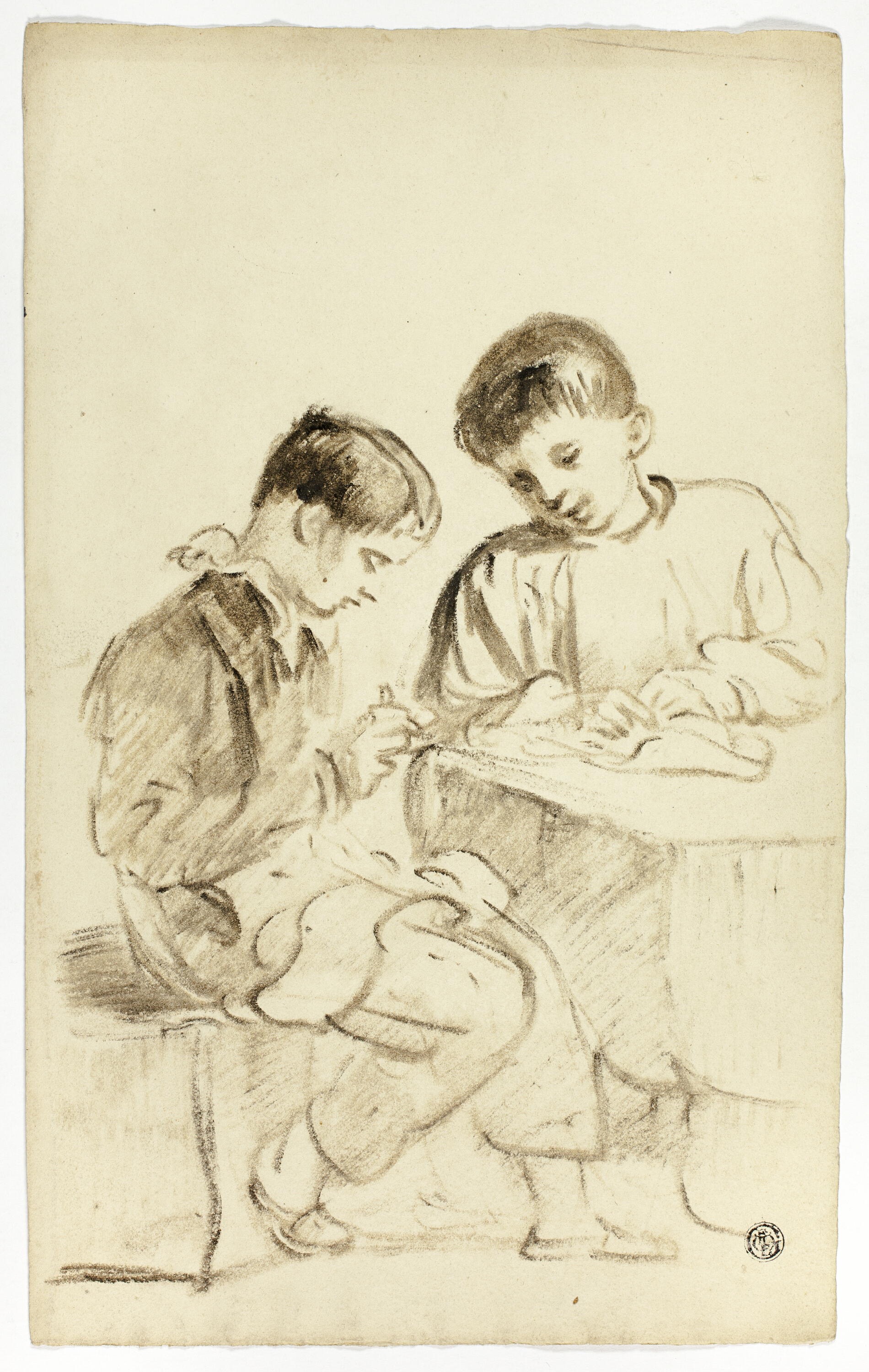
Thomas Jones Barker: Two School Boys (c. 1830)
Schmooze: To converse informally, make small talk or chat (שמועסן, shmuesn, 'converse', from Hebrew: שמועות, shəmūʿōth, 'reports/gossip'; OED, MW). Noun: schmoozer, abbr. schmooze. Wikipedia
"Blessed are the Schmoozers …"
We're each familiar with the snooze alarm, that feature of modern alarm clocks that allows us to temporarily turn off an alarm clock without actually waking, setting up an unconscious response cycle destined to undermine the very intention of setting the alarm. I would count this invention as one of humanity's peak innovations, for it reliably achieves the opposite of its designer's intentions before going on to be in almost ubiquitous use. Everyone has one, and everyone learns to sleep right through it. The very term Snooze Alarm has come to describe where an explanation further confuses and where an excuse convinces otherwise. No salesperson or pitchman wants to "hit The Snooze Alarm" when attempting to persuade. No politician does, either.
A friend running for office might be what anyone might call a wonk, a person so enthused by his knowledge about a subject that he can almost instantly chase anyone else off by just starting an explanation.
Roe-Day-O
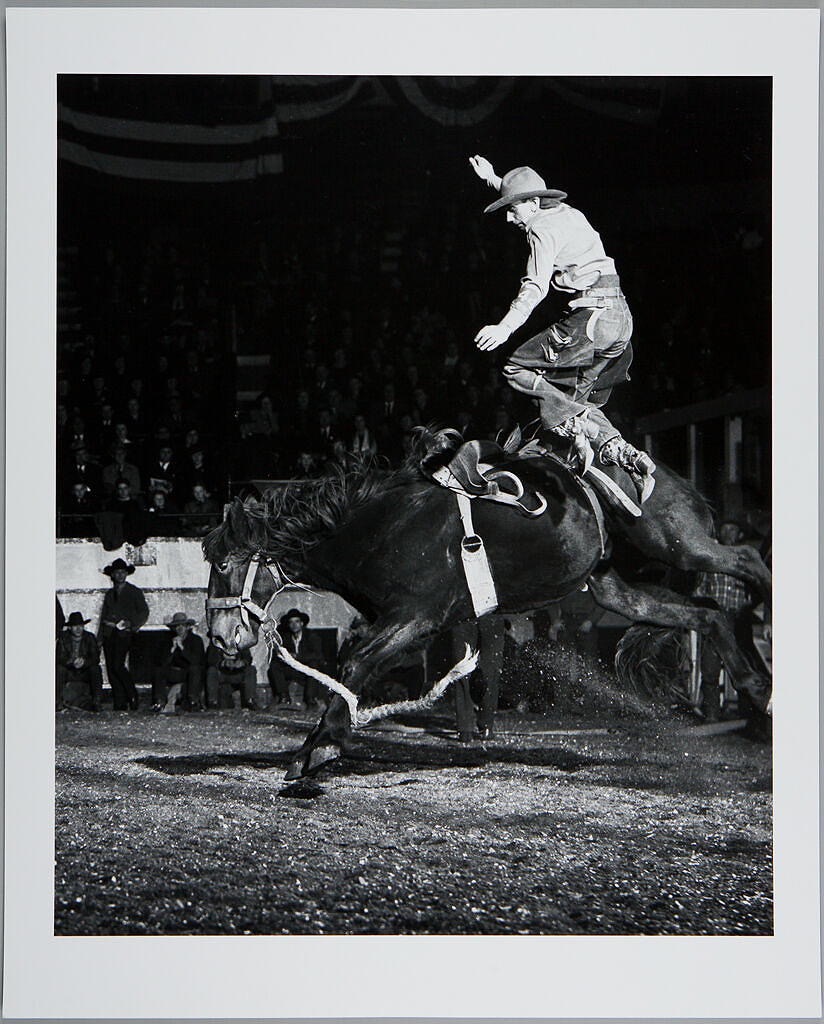
Harold Edgerton: Rodeo (1940)
"Who or what was never made explicit."
I'd never been. I'd never attended the rodeo part in the sixty-some years since I first attended The Southeastern Washington Fair and Rodeo. It required an additional admission, and I had no particular interest. The Fair had also featured parimutuel horse racing, something for which I possessed neither curiosity nor inclination, so my birth family and I satisfied ourselves with the offerings on the Fair side of the fairgrounds: the midway, rides, animal barns, and 4-'achie entries, massive ice cream bars, and, of course, the Dippy Dogs, the local variation on corn dogs, and turkey legs. We'd see the fair queens in the parade and witness loads of cowboys, even some with cattle as well as hat, but we were never once tempted to enter into that world, even as witnesses. Never once until last night, that is.
Friends offered us loge seats in one of the newly-constructed platform boxes suspended above the chutes on the opposite side of the arena.
RealPolitic
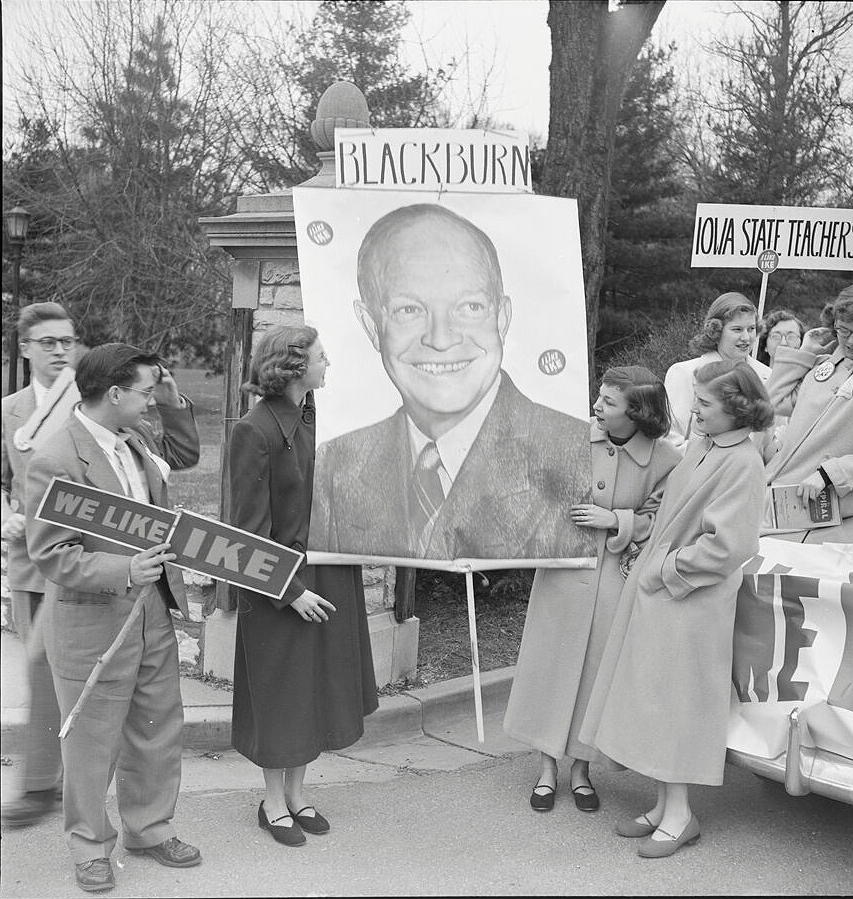
Jack Gould:
Untitled [several people holding political posters
and signs at mock convention] (1955)
The Muse works the passing crowd. The Pavilion at the Fair serves as its Grand Central Station. Families move through the aisles, stopping at booths to collect free handouts and enter raffles. One booth offers a free set of Bluetooth speakers; another, eternal salvation. The politicians do not dominate this space, though they are present: a city council candidate and The Muse, candidate for an open position on the local Port commission. I swear she can pull almost anyone in for at least a brief conversation—many last much longer as she makes some personal connection with the potential voter.
She starts with The Question, the qualifying question intended to winnow out those who cannot vote for her. "Are you a voter in this county?"
Gutted
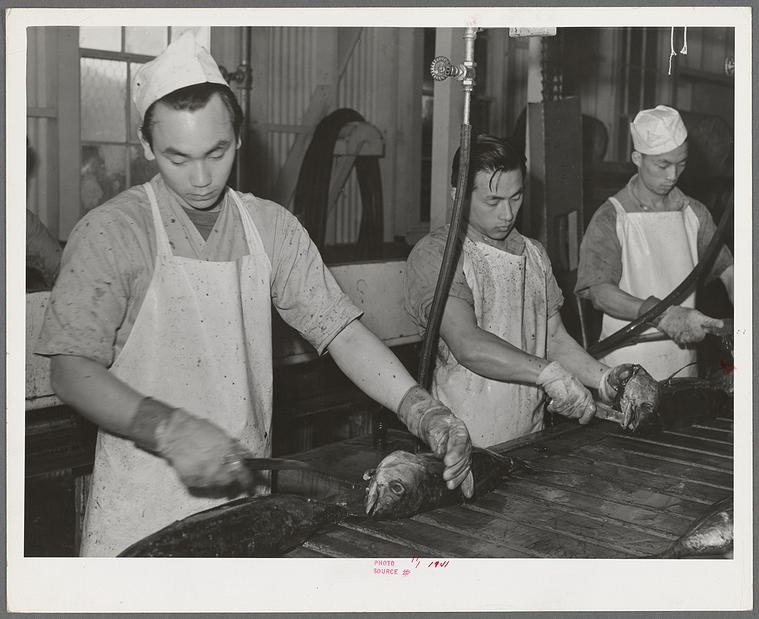
Russell Lee:
Gutting tuna at the
Columbia River Packing Association.
Astoria, Oregon (1941)
"It would have just been my fault."
——
The Frog
Be kind and tender to the Frog,
And do not call him names,
As ‘Slimy skin,’ or ‘Polly-wog,’
Or likewise ‘Ugly James,’
Or ‘Gape-a-grin,’ or ‘Toad-gone-wrong,’
Or ‘Billy Bandy-knees’:
The Frog is justly sensitive
To epithets like these.
No animal will more repay
A treatment kind and fair;
At least so lonely people say
Who keep a frog (and, by the way,
They are extremely rare).
HILAIRE BELLOC
—
I arrived at the Fairgrounds just after eight a.m.
Slip over here for more ...

